Analyzing Entrepreneurship and Small Business Research
VerifiedAdded on 2021/02/22
|13
|3760
|48
AI Summary
The provided document is a review of multiple entrepreneurship studies and research papers on small businesses and entrepreneurship. The topics include small business financing, women's apparel entrepreneurship, paradigm shifts in SME competitive advantages, public procurement as a support policy, technology business incubation, entrepreneurship in emerging market economies, social responsibility in small businesses, business failure and entrepreneurship, and the impact of environmental legislation on SMEs. The review aims to provide an overview of the state of knowledge in these areas and identify key trends and perspectives.
Contribute Materials
Your contribution can guide someone’s learning journey. Share your
documents today.

Entrepreneurship and
Small Business
Management
Small Business
Management
Secure Best Marks with AI Grader
Need help grading? Try our AI Grader for instant feedback on your assignments.
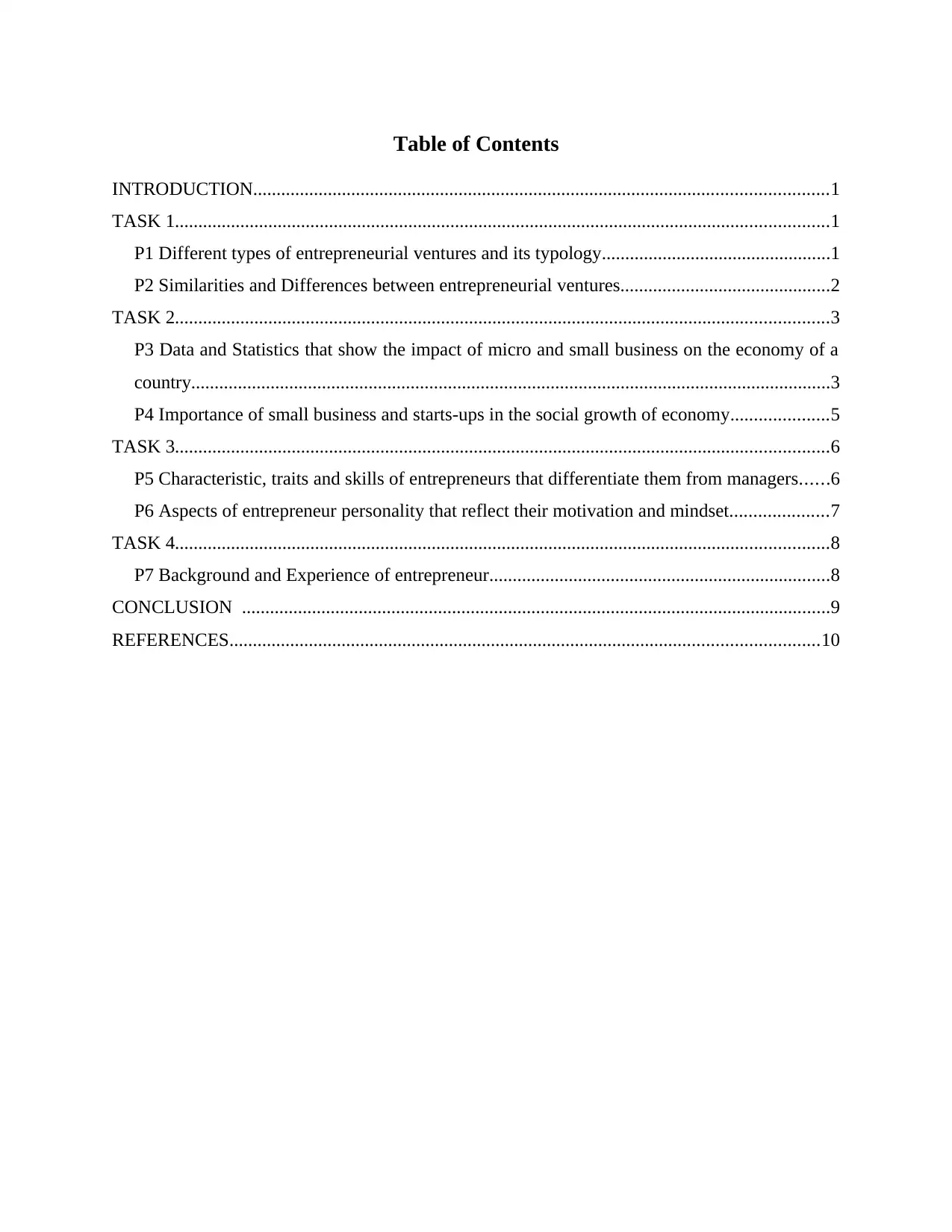
Table of Contents
INTRODUCTION...........................................................................................................................1
TASK 1............................................................................................................................................1
P1 Different types of entrepreneurial ventures and its typology.................................................1
P2 Similarities and Differences between entrepreneurial ventures.............................................2
TASK 2............................................................................................................................................3
P3 Data and Statistics that show the impact of micro and small business on the economy of a
country.........................................................................................................................................3
P4 Importance of small business and starts-ups in the social growth of economy.....................5
TASK 3............................................................................................................................................6
P5 Characteristic, traits and skills of entrepreneurs that differentiate them from managers......6
P6 Aspects of entrepreneur personality that reflect their motivation and mindset.....................7
TASK 4............................................................................................................................................8
P7 Background and Experience of entrepreneur.........................................................................8
CONCLUSION ..............................................................................................................................9
REFERENCES..............................................................................................................................10
INTRODUCTION...........................................................................................................................1
TASK 1............................................................................................................................................1
P1 Different types of entrepreneurial ventures and its typology.................................................1
P2 Similarities and Differences between entrepreneurial ventures.............................................2
TASK 2............................................................................................................................................3
P3 Data and Statistics that show the impact of micro and small business on the economy of a
country.........................................................................................................................................3
P4 Importance of small business and starts-ups in the social growth of economy.....................5
TASK 3............................................................................................................................................6
P5 Characteristic, traits and skills of entrepreneurs that differentiate them from managers......6
P6 Aspects of entrepreneur personality that reflect their motivation and mindset.....................7
TASK 4............................................................................................................................................8
P7 Background and Experience of entrepreneur.........................................................................8
CONCLUSION ..............................................................................................................................9
REFERENCES..............................................................................................................................10
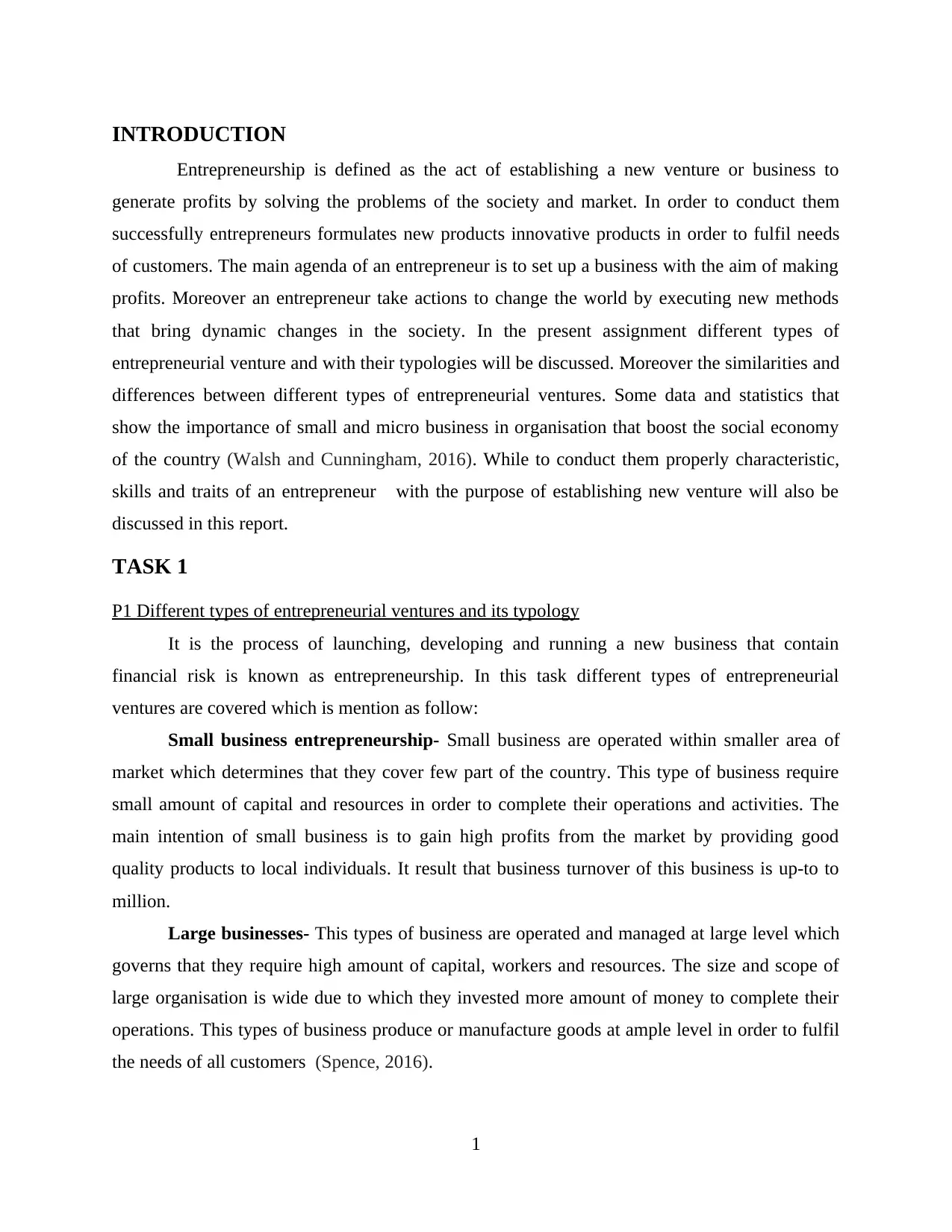
INTRODUCTION
Entrepreneurship is defined as the act of establishing a new venture or business to
generate profits by solving the problems of the society and market. In order to conduct them
successfully entrepreneurs formulates new products innovative products in order to fulfil needs
of customers. The main agenda of an entrepreneur is to set up a business with the aim of making
profits. Moreover an entrepreneur take actions to change the world by executing new methods
that bring dynamic changes in the society. In the present assignment different types of
entrepreneurial venture and with their typologies will be discussed. Moreover the similarities and
differences between different types of entrepreneurial ventures. Some data and statistics that
show the importance of small and micro business in organisation that boost the social economy
of the country (Walsh and Cunningham, 2016). While to conduct them properly characteristic,
skills and traits of an entrepreneur with the purpose of establishing new venture will also be
discussed in this report.
TASK 1
P1 Different types of entrepreneurial ventures and its typology
It is the process of launching, developing and running a new business that contain
financial risk is known as entrepreneurship. In this task different types of entrepreneurial
ventures are covered which is mention as follow:
Small business entrepreneurship- Small business are operated within smaller area of
market which determines that they cover few part of the country. This type of business require
small amount of capital and resources in order to complete their operations and activities. The
main intention of small business is to gain high profits from the market by providing good
quality products to local individuals. It result that business turnover of this business is up-to to
million.
Large businesses- This types of business are operated and managed at large level which
governs that they require high amount of capital, workers and resources. The size and scope of
large organisation is wide due to which they invested more amount of money to complete their
operations. This types of business produce or manufacture goods at ample level in order to fulfil
the needs of all customers (Spence, 2016).
1
Entrepreneurship is defined as the act of establishing a new venture or business to
generate profits by solving the problems of the society and market. In order to conduct them
successfully entrepreneurs formulates new products innovative products in order to fulfil needs
of customers. The main agenda of an entrepreneur is to set up a business with the aim of making
profits. Moreover an entrepreneur take actions to change the world by executing new methods
that bring dynamic changes in the society. In the present assignment different types of
entrepreneurial venture and with their typologies will be discussed. Moreover the similarities and
differences between different types of entrepreneurial ventures. Some data and statistics that
show the importance of small and micro business in organisation that boost the social economy
of the country (Walsh and Cunningham, 2016). While to conduct them properly characteristic,
skills and traits of an entrepreneur with the purpose of establishing new venture will also be
discussed in this report.
TASK 1
P1 Different types of entrepreneurial ventures and its typology
It is the process of launching, developing and running a new business that contain
financial risk is known as entrepreneurship. In this task different types of entrepreneurial
ventures are covered which is mention as follow:
Small business entrepreneurship- Small business are operated within smaller area of
market which determines that they cover few part of the country. This type of business require
small amount of capital and resources in order to complete their operations and activities. The
main intention of small business is to gain high profits from the market by providing good
quality products to local individuals. It result that business turnover of this business is up-to to
million.
Large businesses- This types of business are operated and managed at large level which
governs that they require high amount of capital, workers and resources. The size and scope of
large organisation is wide due to which they invested more amount of money to complete their
operations. This types of business produce or manufacture goods at ample level in order to fulfil
the needs of all customers (Spence, 2016).
1
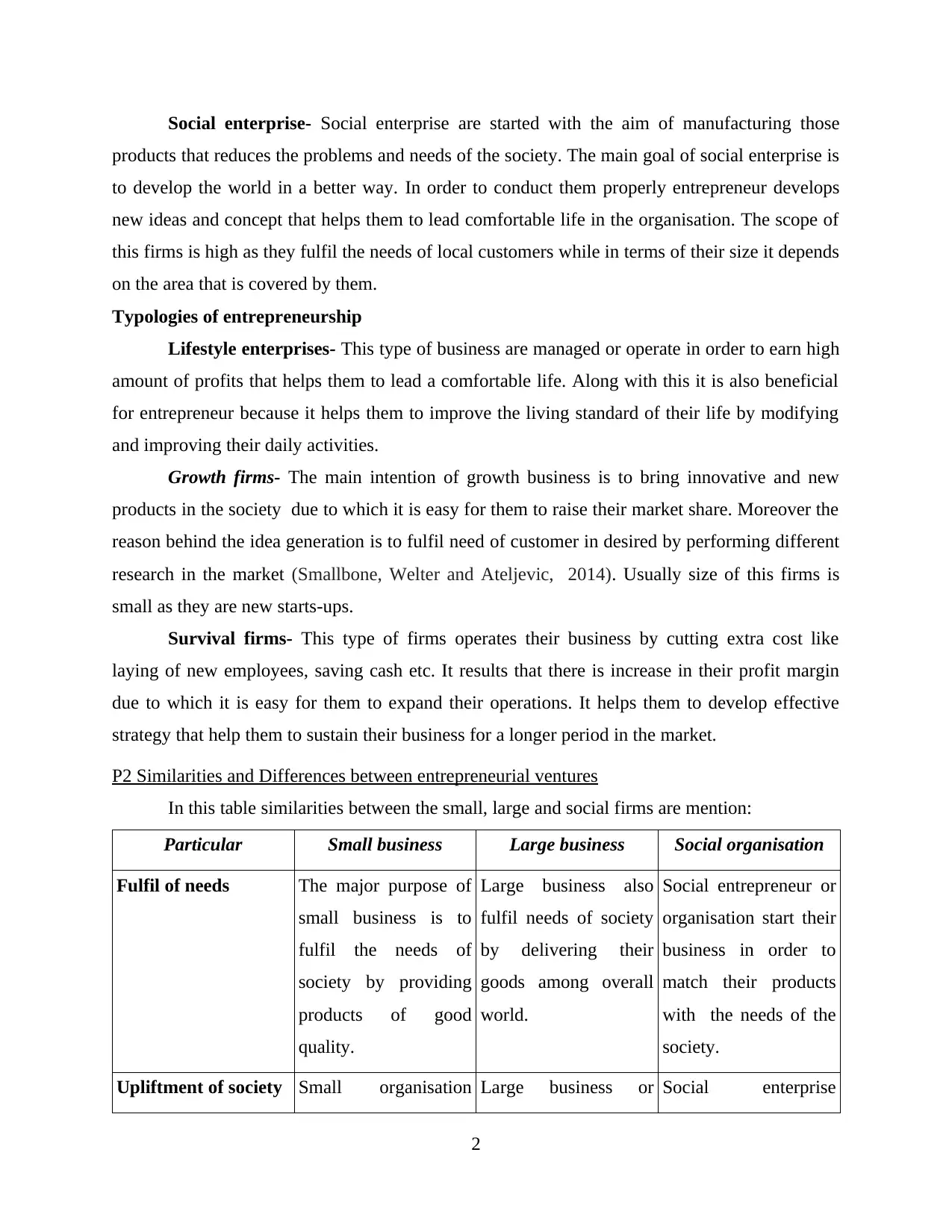
Social enterprise- Social enterprise are started with the aim of manufacturing those
products that reduces the problems and needs of the society. The main goal of social enterprise is
to develop the world in a better way. In order to conduct them properly entrepreneur develops
new ideas and concept that helps them to lead comfortable life in the organisation. The scope of
this firms is high as they fulfil the needs of local customers while in terms of their size it depends
on the area that is covered by them.
Typologies of entrepreneurship
Lifestyle enterprises- This type of business are managed or operate in order to earn high
amount of profits that helps them to lead a comfortable life. Along with this it is also beneficial
for entrepreneur because it helps them to improve the living standard of their life by modifying
and improving their daily activities.
Growth firms- The main intention of growth business is to bring innovative and new
products in the society due to which it is easy for them to raise their market share. Moreover the
reason behind the idea generation is to fulfil need of customer in desired by performing different
research in the market (Smallbone, Welter and Ateljevic, 2014). Usually size of this firms is
small as they are new starts-ups.
Survival firms- This type of firms operates their business by cutting extra cost like
laying of new employees, saving cash etc. It results that there is increase in their profit margin
due to which it is easy for them to expand their operations. It helps them to develop effective
strategy that help them to sustain their business for a longer period in the market.
P2 Similarities and Differences between entrepreneurial ventures
In this table similarities between the small, large and social firms are mention:
Particular Small business Large business Social organisation
Fulfil of needs The major purpose of
small business is to
fulfil the needs of
society by providing
products of good
quality.
Large business also
fulfil needs of society
by delivering their
goods among overall
world.
Social entrepreneur or
organisation start their
business in order to
match their products
with the needs of the
society.
Upliftment of society Small organisation Large business or Social enterprise
2
products that reduces the problems and needs of the society. The main goal of social enterprise is
to develop the world in a better way. In order to conduct them properly entrepreneur develops
new ideas and concept that helps them to lead comfortable life in the organisation. The scope of
this firms is high as they fulfil the needs of local customers while in terms of their size it depends
on the area that is covered by them.
Typologies of entrepreneurship
Lifestyle enterprises- This type of business are managed or operate in order to earn high
amount of profits that helps them to lead a comfortable life. Along with this it is also beneficial
for entrepreneur because it helps them to improve the living standard of their life by modifying
and improving their daily activities.
Growth firms- The main intention of growth business is to bring innovative and new
products in the society due to which it is easy for them to raise their market share. Moreover the
reason behind the idea generation is to fulfil need of customer in desired by performing different
research in the market (Smallbone, Welter and Ateljevic, 2014). Usually size of this firms is
small as they are new starts-ups.
Survival firms- This type of firms operates their business by cutting extra cost like
laying of new employees, saving cash etc. It results that there is increase in their profit margin
due to which it is easy for them to expand their operations. It helps them to develop effective
strategy that help them to sustain their business for a longer period in the market.
P2 Similarities and Differences between entrepreneurial ventures
In this table similarities between the small, large and social firms are mention:
Particular Small business Large business Social organisation
Fulfil of needs The major purpose of
small business is to
fulfil the needs of
society by providing
products of good
quality.
Large business also
fulfil needs of society
by delivering their
goods among overall
world.
Social entrepreneur or
organisation start their
business in order to
match their products
with the needs of the
society.
Upliftment of society Small organisation Large business or Social enterprise
2
Secure Best Marks with AI Grader
Need help grading? Try our AI Grader for instant feedback on your assignments.
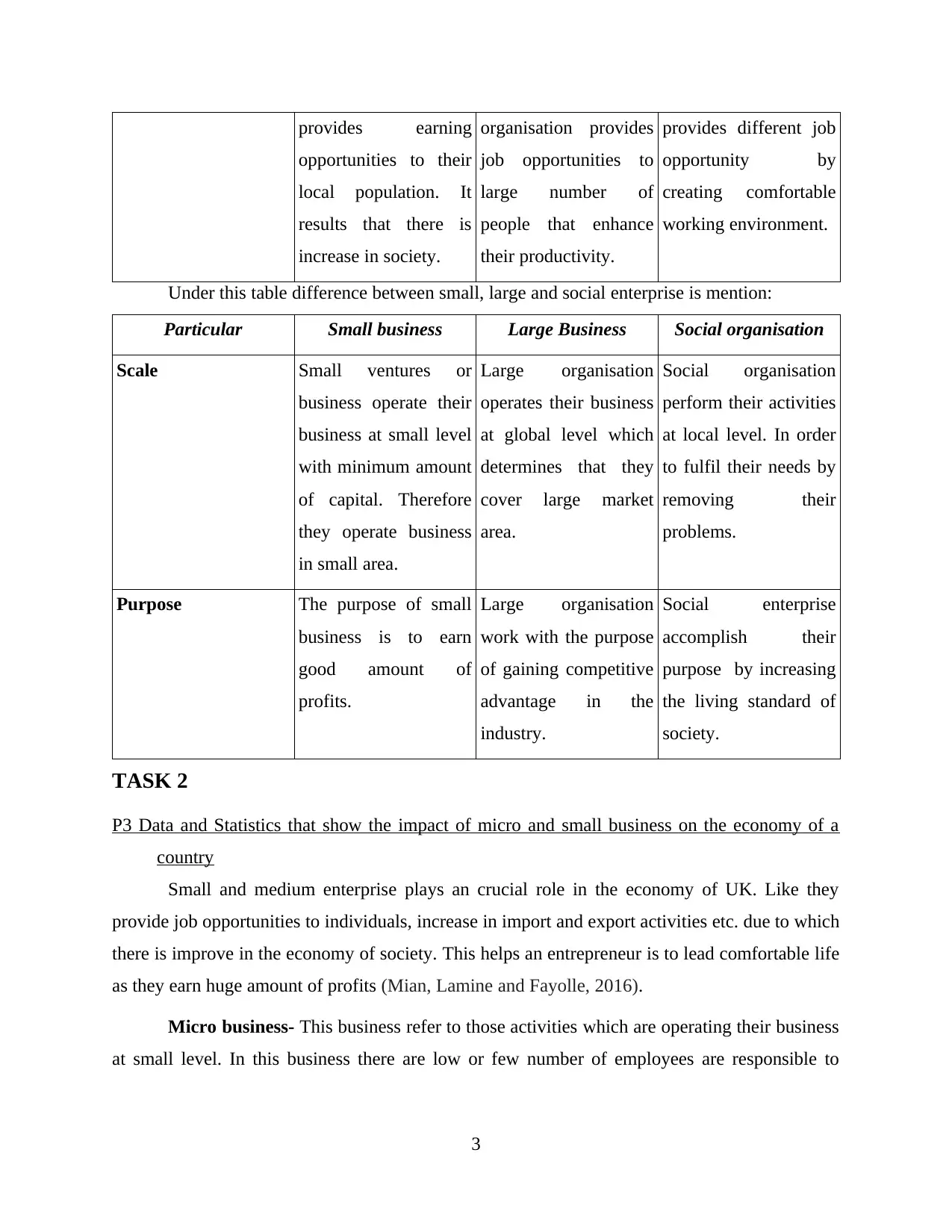
provides earning
opportunities to their
local population. It
results that there is
increase in society.
organisation provides
job opportunities to
large number of
people that enhance
their productivity.
provides different job
opportunity by
creating comfortable
working environment.
Under this table difference between small, large and social enterprise is mention:
Particular Small business Large Business Social organisation
Scale Small ventures or
business operate their
business at small level
with minimum amount
of capital. Therefore
they operate business
in small area.
Large organisation
operates their business
at global level which
determines that they
cover large market
area.
Social organisation
perform their activities
at local level. In order
to fulfil their needs by
removing their
problems.
Purpose The purpose of small
business is to earn
good amount of
profits.
Large organisation
work with the purpose
of gaining competitive
advantage in the
industry.
Social enterprise
accomplish their
purpose by increasing
the living standard of
society.
TASK 2
P3 Data and Statistics that show the impact of micro and small business on the economy of a
country
Small and medium enterprise plays an crucial role in the economy of UK. Like they
provide job opportunities to individuals, increase in import and export activities etc. due to which
there is improve in the economy of society. This helps an entrepreneur is to lead comfortable life
as they earn huge amount of profits (Mian, Lamine and Fayolle, 2016).
Micro business- This business refer to those activities which are operating their business
at small level. In this business there are low or few number of employees are responsible to
3
opportunities to their
local population. It
results that there is
increase in society.
organisation provides
job opportunities to
large number of
people that enhance
their productivity.
provides different job
opportunity by
creating comfortable
working environment.
Under this table difference between small, large and social enterprise is mention:
Particular Small business Large Business Social organisation
Scale Small ventures or
business operate their
business at small level
with minimum amount
of capital. Therefore
they operate business
in small area.
Large organisation
operates their business
at global level which
determines that they
cover large market
area.
Social organisation
perform their activities
at local level. In order
to fulfil their needs by
removing their
problems.
Purpose The purpose of small
business is to earn
good amount of
profits.
Large organisation
work with the purpose
of gaining competitive
advantage in the
industry.
Social enterprise
accomplish their
purpose by increasing
the living standard of
society.
TASK 2
P3 Data and Statistics that show the impact of micro and small business on the economy of a
country
Small and medium enterprise plays an crucial role in the economy of UK. Like they
provide job opportunities to individuals, increase in import and export activities etc. due to which
there is improve in the economy of society. This helps an entrepreneur is to lead comfortable life
as they earn huge amount of profits (Mian, Lamine and Fayolle, 2016).
Micro business- This business refer to those activities which are operating their business
at small level. In this business there are low or few number of employees are responsible to
3
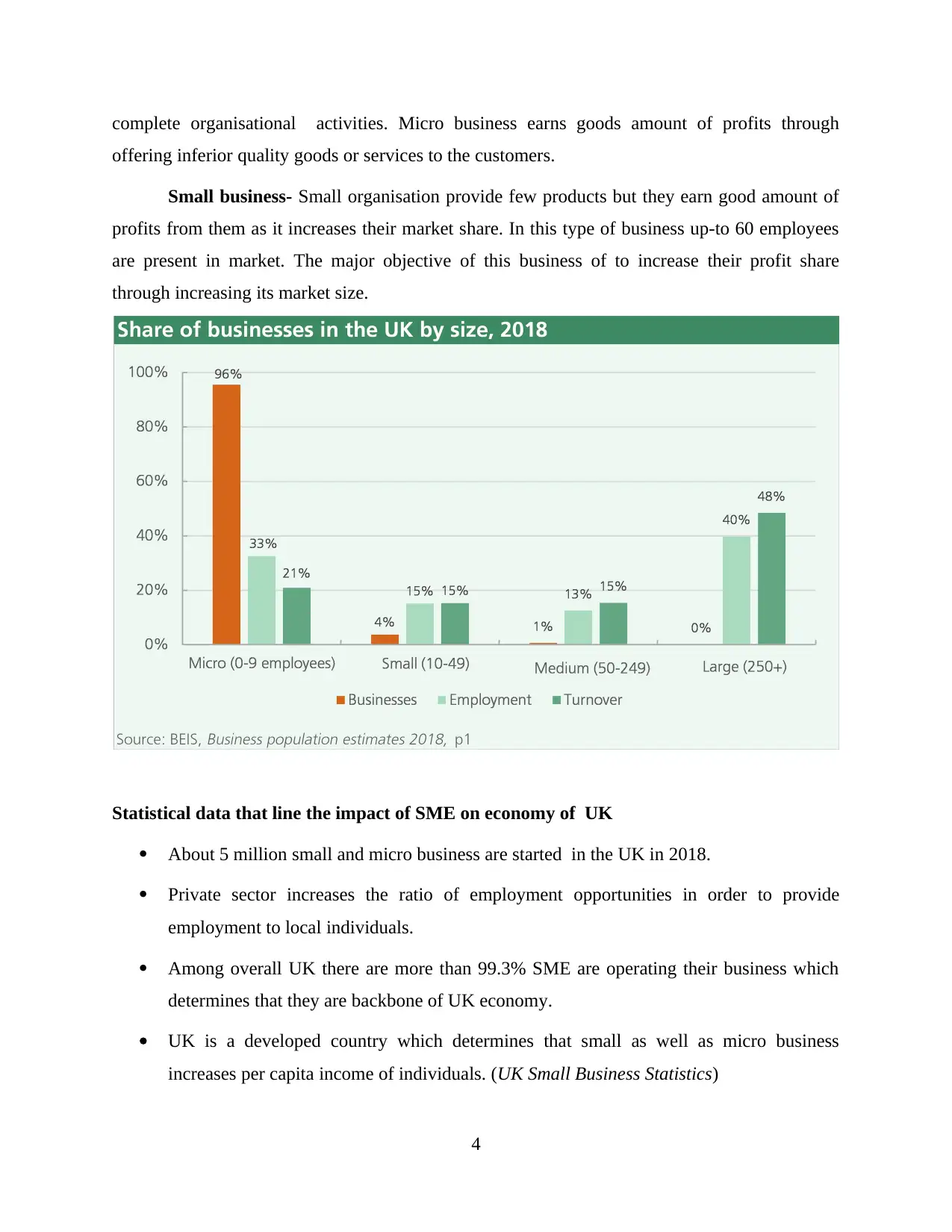
complete organisational activities. Micro business earns goods amount of profits through
offering inferior quality goods or services to the customers.
Small business- Small organisation provide few products but they earn good amount of
profits from them as it increases their market share. In this type of business up-to 60 employees
are present in market. The major objective of this business of to increase their profit share
through increasing its market size.
Statistical data that line the impact of SME on economy of UK
About 5 million small and micro business are started in the UK in 2018.
Private sector increases the ratio of employment opportunities in order to provide
employment to local individuals.
Among overall UK there are more than 99.3% SME are operating their business which
determines that they are backbone of UK economy.
UK is a developed country which determines that small as well as micro business
increases per capita income of individuals. (UK Small Business Statistics)
4
offering inferior quality goods or services to the customers.
Small business- Small organisation provide few products but they earn good amount of
profits from them as it increases their market share. In this type of business up-to 60 employees
are present in market. The major objective of this business of to increase their profit share
through increasing its market size.
Statistical data that line the impact of SME on economy of UK
About 5 million small and micro business are started in the UK in 2018.
Private sector increases the ratio of employment opportunities in order to provide
employment to local individuals.
Among overall UK there are more than 99.3% SME are operating their business which
determines that they are backbone of UK economy.
UK is a developed country which determines that small as well as micro business
increases per capita income of individuals. (UK Small Business Statistics)
4
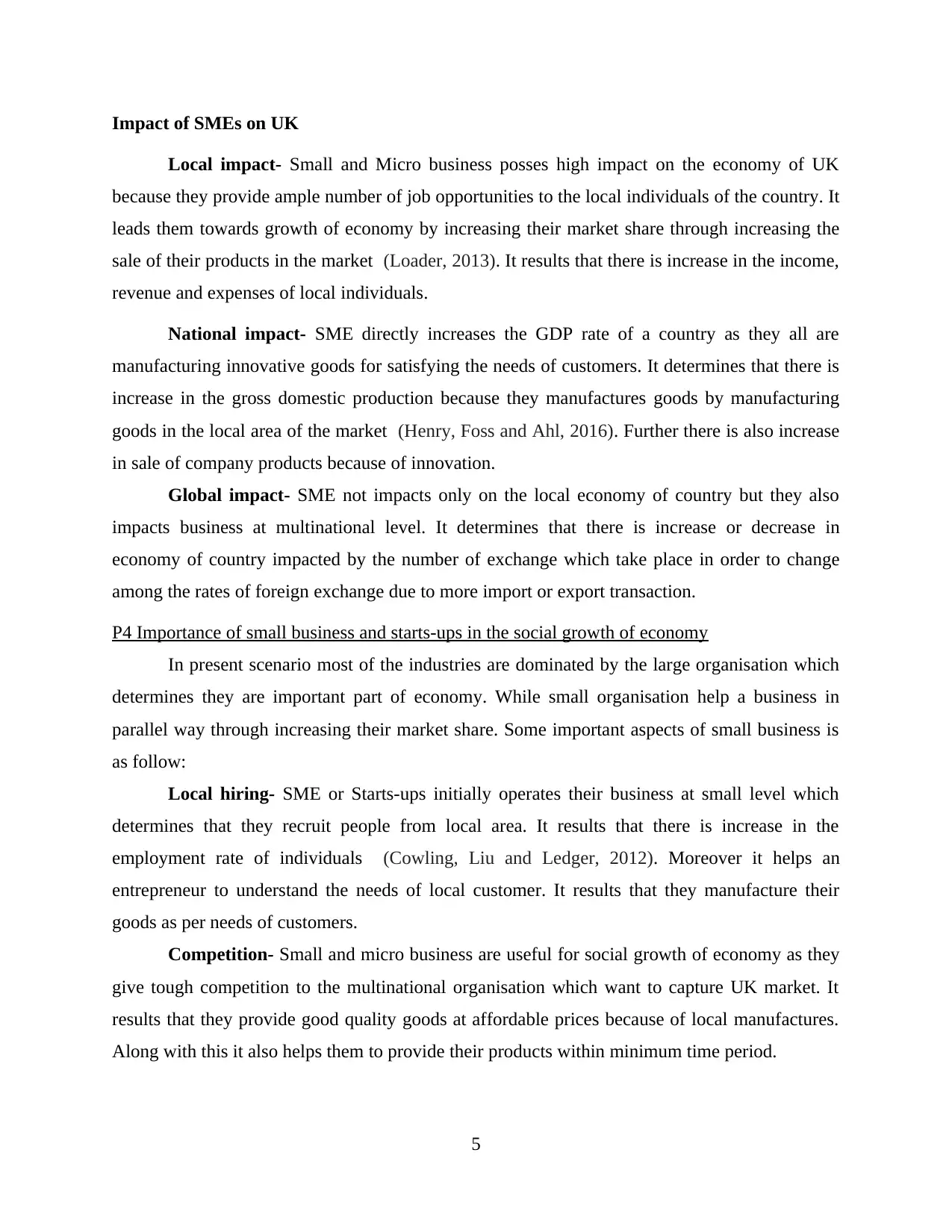
Impact of SMEs on UK
Local impact- Small and Micro business posses high impact on the economy of UK
because they provide ample number of job opportunities to the local individuals of the country. It
leads them towards growth of economy by increasing their market share through increasing the
sale of their products in the market (Loader, 2013). It results that there is increase in the income,
revenue and expenses of local individuals.
National impact- SME directly increases the GDP rate of a country as they all are
manufacturing innovative goods for satisfying the needs of customers. It determines that there is
increase in the gross domestic production because they manufactures goods by manufacturing
goods in the local area of the market (Henry, Foss and Ahl, 2016). Further there is also increase
in sale of company products because of innovation.
Global impact- SME not impacts only on the local economy of country but they also
impacts business at multinational level. It determines that there is increase or decrease in
economy of country impacted by the number of exchange which take place in order to change
among the rates of foreign exchange due to more import or export transaction.
P4 Importance of small business and starts-ups in the social growth of economy
In present scenario most of the industries are dominated by the large organisation which
determines they are important part of economy. While small organisation help a business in
parallel way through increasing their market share. Some important aspects of small business is
as follow:
Local hiring- SME or Starts-ups initially operates their business at small level which
determines that they recruit people from local area. It results that there is increase in the
employment rate of individuals (Cowling, Liu and Ledger, 2012). Moreover it helps an
entrepreneur to understand the needs of local customer. It results that they manufacture their
goods as per needs of customers.
Competition- Small and micro business are useful for social growth of economy as they
give tough competition to the multinational organisation which want to capture UK market. It
results that they provide good quality goods at affordable prices because of local manufactures.
Along with this it also helps them to provide their products within minimum time period.
5
Local impact- Small and Micro business posses high impact on the economy of UK
because they provide ample number of job opportunities to the local individuals of the country. It
leads them towards growth of economy by increasing their market share through increasing the
sale of their products in the market (Loader, 2013). It results that there is increase in the income,
revenue and expenses of local individuals.
National impact- SME directly increases the GDP rate of a country as they all are
manufacturing innovative goods for satisfying the needs of customers. It determines that there is
increase in the gross domestic production because they manufactures goods by manufacturing
goods in the local area of the market (Henry, Foss and Ahl, 2016). Further there is also increase
in sale of company products because of innovation.
Global impact- SME not impacts only on the local economy of country but they also
impacts business at multinational level. It determines that there is increase or decrease in
economy of country impacted by the number of exchange which take place in order to change
among the rates of foreign exchange due to more import or export transaction.
P4 Importance of small business and starts-ups in the social growth of economy
In present scenario most of the industries are dominated by the large organisation which
determines they are important part of economy. While small organisation help a business in
parallel way through increasing their market share. Some important aspects of small business is
as follow:
Local hiring- SME or Starts-ups initially operates their business at small level which
determines that they recruit people from local area. It results that there is increase in the
employment rate of individuals (Cowling, Liu and Ledger, 2012). Moreover it helps an
entrepreneur to understand the needs of local customer. It results that they manufacture their
goods as per needs of customers.
Competition- Small and micro business are useful for social growth of economy as they
give tough competition to the multinational organisation which want to capture UK market. It
results that they provide good quality goods at affordable prices because of local manufactures.
Along with this it also helps them to provide their products within minimum time period.
5
Paraphrase This Document
Need a fresh take? Get an instant paraphrase of this document with our AI Paraphraser
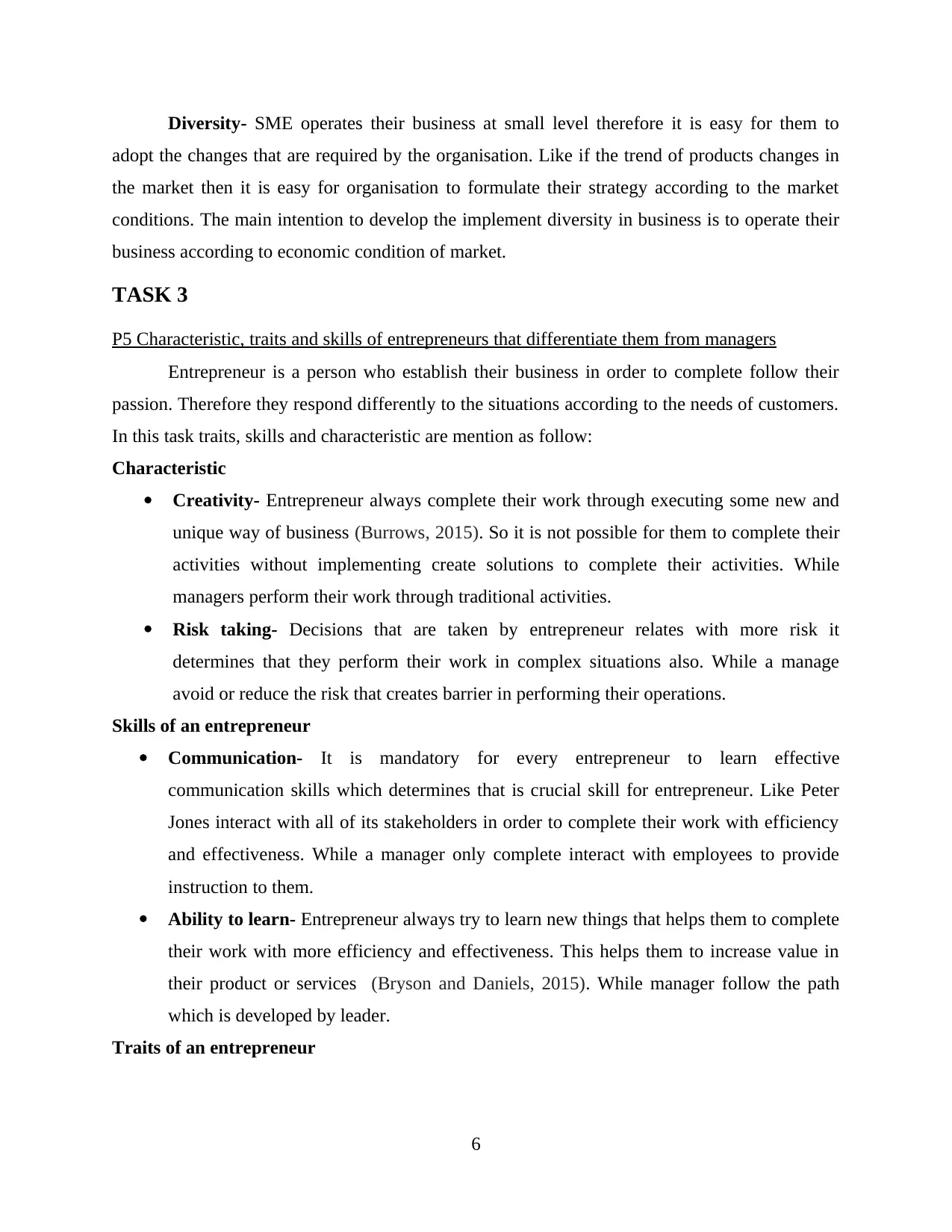
Diversity- SME operates their business at small level therefore it is easy for them to
adopt the changes that are required by the organisation. Like if the trend of products changes in
the market then it is easy for organisation to formulate their strategy according to the market
conditions. The main intention to develop the implement diversity in business is to operate their
business according to economic condition of market.
TASK 3
P5 Characteristic, traits and skills of entrepreneurs that differentiate them from managers
Entrepreneur is a person who establish their business in order to complete follow their
passion. Therefore they respond differently to the situations according to the needs of customers.
In this task traits, skills and characteristic are mention as follow:
Characteristic
Creativity- Entrepreneur always complete their work through executing some new and
unique way of business (Burrows, 2015). So it is not possible for them to complete their
activities without implementing create solutions to complete their activities. While
managers perform their work through traditional activities.
Risk taking- Decisions that are taken by entrepreneur relates with more risk it
determines that they perform their work in complex situations also. While a manage
avoid or reduce the risk that creates barrier in performing their operations.
Skills of an entrepreneur
Communication- It is mandatory for every entrepreneur to learn effective
communication skills which determines that is crucial skill for entrepreneur. Like Peter
Jones interact with all of its stakeholders in order to complete their work with efficiency
and effectiveness. While a manager only complete interact with employees to provide
instruction to them.
Ability to learn- Entrepreneur always try to learn new things that helps them to complete
their work with more efficiency and effectiveness. This helps them to increase value in
their product or services (Bryson and Daniels, 2015). While manager follow the path
which is developed by leader.
Traits of an entrepreneur
6
adopt the changes that are required by the organisation. Like if the trend of products changes in
the market then it is easy for organisation to formulate their strategy according to the market
conditions. The main intention to develop the implement diversity in business is to operate their
business according to economic condition of market.
TASK 3
P5 Characteristic, traits and skills of entrepreneurs that differentiate them from managers
Entrepreneur is a person who establish their business in order to complete follow their
passion. Therefore they respond differently to the situations according to the needs of customers.
In this task traits, skills and characteristic are mention as follow:
Characteristic
Creativity- Entrepreneur always complete their work through executing some new and
unique way of business (Burrows, 2015). So it is not possible for them to complete their
activities without implementing create solutions to complete their activities. While
managers perform their work through traditional activities.
Risk taking- Decisions that are taken by entrepreneur relates with more risk it
determines that they perform their work in complex situations also. While a manage
avoid or reduce the risk that creates barrier in performing their operations.
Skills of an entrepreneur
Communication- It is mandatory for every entrepreneur to learn effective
communication skills which determines that is crucial skill for entrepreneur. Like Peter
Jones interact with all of its stakeholders in order to complete their work with efficiency
and effectiveness. While a manager only complete interact with employees to provide
instruction to them.
Ability to learn- Entrepreneur always try to learn new things that helps them to complete
their work with more efficiency and effectiveness. This helps them to increase value in
their product or services (Bryson and Daniels, 2015). While manager follow the path
which is developed by leader.
Traits of an entrepreneur
6
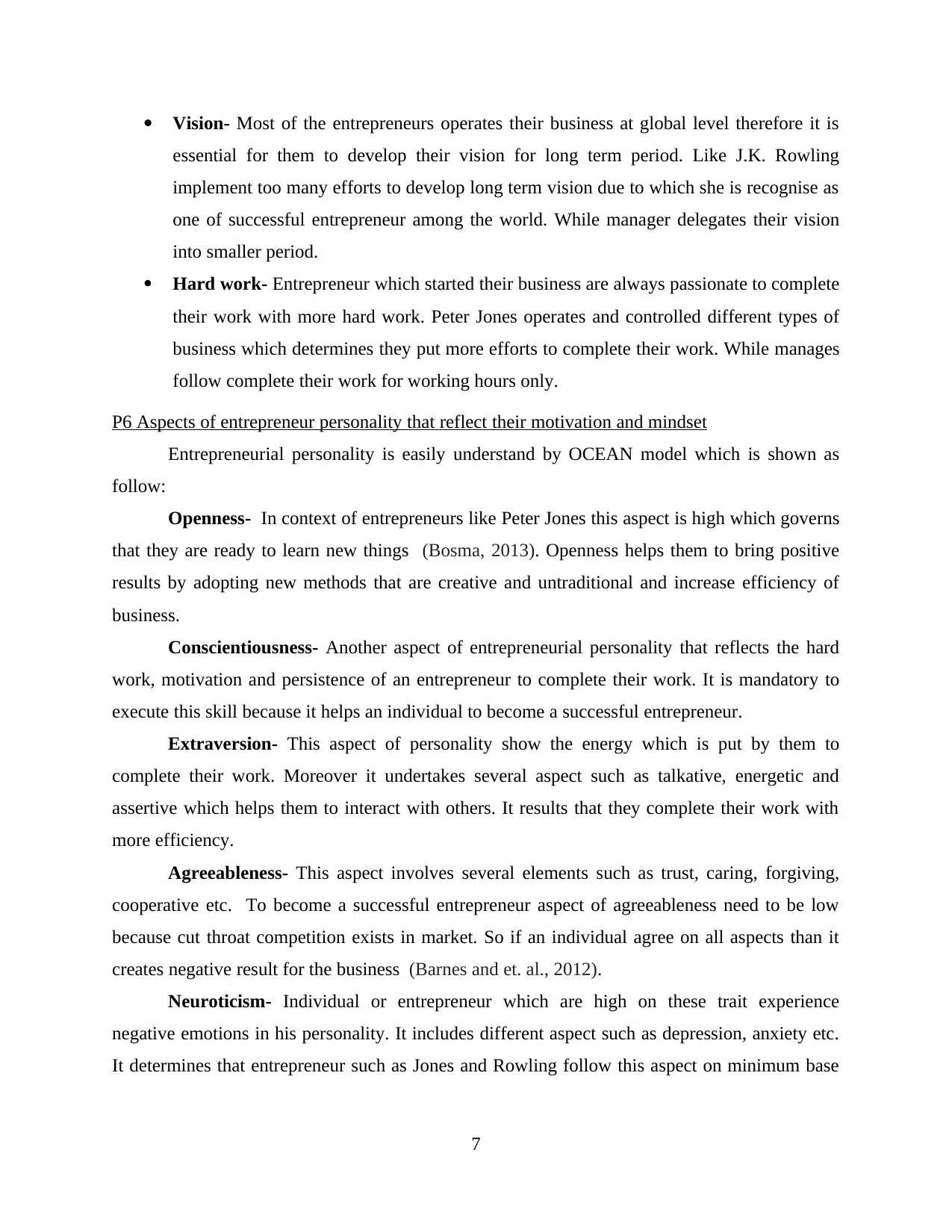
Vision- Most of the entrepreneurs operates their business at global level therefore it is
essential for them to develop their vision for long term period. Like J.K. Rowling
implement too many efforts to develop long term vision due to which she is recognise as
one of successful entrepreneur among the world. While manager delegates their vision
into smaller period.
Hard work- Entrepreneur which started their business are always passionate to complete
their work with more hard work. Peter Jones operates and controlled different types of
business which determines they put more efforts to complete their work. While manages
follow complete their work for working hours only.
P6 Aspects of entrepreneur personality that reflect their motivation and mindset
Entrepreneurial personality is easily understand by OCEAN model which is shown as
follow:
Openness- In context of entrepreneurs like Peter Jones this aspect is high which governs
that they are ready to learn new things (Bosma, 2013). Openness helps them to bring positive
results by adopting new methods that are creative and untraditional and increase efficiency of
business.
Conscientiousness- Another aspect of entrepreneurial personality that reflects the hard
work, motivation and persistence of an entrepreneur to complete their work. It is mandatory to
execute this skill because it helps an individual to become a successful entrepreneur.
Extraversion- This aspect of personality show the energy which is put by them to
complete their work. Moreover it undertakes several aspect such as talkative, energetic and
assertive which helps them to interact with others. It results that they complete their work with
more efficiency.
Agreeableness- This aspect involves several elements such as trust, caring, forgiving,
cooperative etc. To become a successful entrepreneur aspect of agreeableness need to be low
because cut throat competition exists in market. So if an individual agree on all aspects than it
creates negative result for the business (Barnes and et. al., 2012).
Neuroticism- Individual or entrepreneur which are high on these trait experience
negative emotions in his personality. It includes different aspect such as depression, anxiety etc.
It determines that entrepreneur such as Jones and Rowling follow this aspect on minimum base
7
essential for them to develop their vision for long term period. Like J.K. Rowling
implement too many efforts to develop long term vision due to which she is recognise as
one of successful entrepreneur among the world. While manager delegates their vision
into smaller period.
Hard work- Entrepreneur which started their business are always passionate to complete
their work with more hard work. Peter Jones operates and controlled different types of
business which determines they put more efforts to complete their work. While manages
follow complete their work for working hours only.
P6 Aspects of entrepreneur personality that reflect their motivation and mindset
Entrepreneurial personality is easily understand by OCEAN model which is shown as
follow:
Openness- In context of entrepreneurs like Peter Jones this aspect is high which governs
that they are ready to learn new things (Bosma, 2013). Openness helps them to bring positive
results by adopting new methods that are creative and untraditional and increase efficiency of
business.
Conscientiousness- Another aspect of entrepreneurial personality that reflects the hard
work, motivation and persistence of an entrepreneur to complete their work. It is mandatory to
execute this skill because it helps an individual to become a successful entrepreneur.
Extraversion- This aspect of personality show the energy which is put by them to
complete their work. Moreover it undertakes several aspect such as talkative, energetic and
assertive which helps them to interact with others. It results that they complete their work with
more efficiency.
Agreeableness- This aspect involves several elements such as trust, caring, forgiving,
cooperative etc. To become a successful entrepreneur aspect of agreeableness need to be low
because cut throat competition exists in market. So if an individual agree on all aspects than it
creates negative result for the business (Barnes and et. al., 2012).
Neuroticism- Individual or entrepreneur which are high on these trait experience
negative emotions in his personality. It includes different aspect such as depression, anxiety etc.
It determines that entrepreneur such as Jones and Rowling follow this aspect on minimum base
7
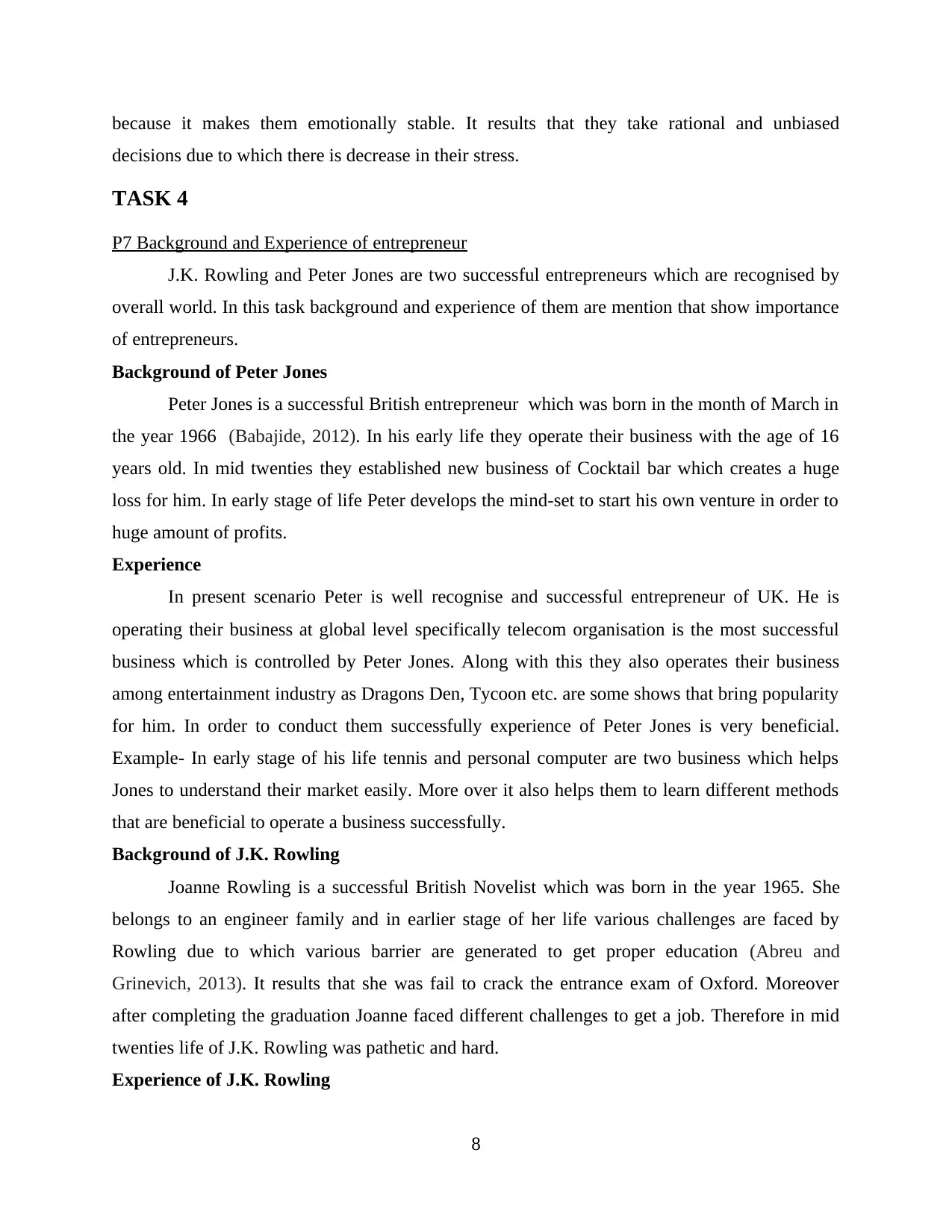
because it makes them emotionally stable. It results that they take rational and unbiased
decisions due to which there is decrease in their stress.
TASK 4
P7 Background and Experience of entrepreneur
J.K. Rowling and Peter Jones are two successful entrepreneurs which are recognised by
overall world. In this task background and experience of them are mention that show importance
of entrepreneurs.
Background of Peter Jones
Peter Jones is a successful British entrepreneur which was born in the month of March in
the year 1966 (Babajide, 2012). In his early life they operate their business with the age of 16
years old. In mid twenties they established new business of Cocktail bar which creates a huge
loss for him. In early stage of life Peter develops the mind-set to start his own venture in order to
huge amount of profits.
Experience
In present scenario Peter is well recognise and successful entrepreneur of UK. He is
operating their business at global level specifically telecom organisation is the most successful
business which is controlled by Peter Jones. Along with this they also operates their business
among entertainment industry as Dragons Den, Tycoon etc. are some shows that bring popularity
for him. In order to conduct them successfully experience of Peter Jones is very beneficial.
Example- In early stage of his life tennis and personal computer are two business which helps
Jones to understand their market easily. More over it also helps them to learn different methods
that are beneficial to operate a business successfully.
Background of J.K. Rowling
Joanne Rowling is a successful British Novelist which was born in the year 1965. She
belongs to an engineer family and in earlier stage of her life various challenges are faced by
Rowling due to which various barrier are generated to get proper education (Abreu and
Grinevich, 2013). It results that she was fail to crack the entrance exam of Oxford. Moreover
after completing the graduation Joanne faced different challenges to get a job. Therefore in mid
twenties life of J.K. Rowling was pathetic and hard.
Experience of J.K. Rowling
8
decisions due to which there is decrease in their stress.
TASK 4
P7 Background and Experience of entrepreneur
J.K. Rowling and Peter Jones are two successful entrepreneurs which are recognised by
overall world. In this task background and experience of them are mention that show importance
of entrepreneurs.
Background of Peter Jones
Peter Jones is a successful British entrepreneur which was born in the month of March in
the year 1966 (Babajide, 2012). In his early life they operate their business with the age of 16
years old. In mid twenties they established new business of Cocktail bar which creates a huge
loss for him. In early stage of life Peter develops the mind-set to start his own venture in order to
huge amount of profits.
Experience
In present scenario Peter is well recognise and successful entrepreneur of UK. He is
operating their business at global level specifically telecom organisation is the most successful
business which is controlled by Peter Jones. Along with this they also operates their business
among entertainment industry as Dragons Den, Tycoon etc. are some shows that bring popularity
for him. In order to conduct them successfully experience of Peter Jones is very beneficial.
Example- In early stage of his life tennis and personal computer are two business which helps
Jones to understand their market easily. More over it also helps them to learn different methods
that are beneficial to operate a business successfully.
Background of J.K. Rowling
Joanne Rowling is a successful British Novelist which was born in the year 1965. She
belongs to an engineer family and in earlier stage of her life various challenges are faced by
Rowling due to which various barrier are generated to get proper education (Abreu and
Grinevich, 2013). It results that she was fail to crack the entrance exam of Oxford. Moreover
after completing the graduation Joanne faced different challenges to get a job. Therefore in mid
twenties life of J.K. Rowling was pathetic and hard.
Experience of J.K. Rowling
8
Secure Best Marks with AI Grader
Need help grading? Try our AI Grader for instant feedback on your assignments.
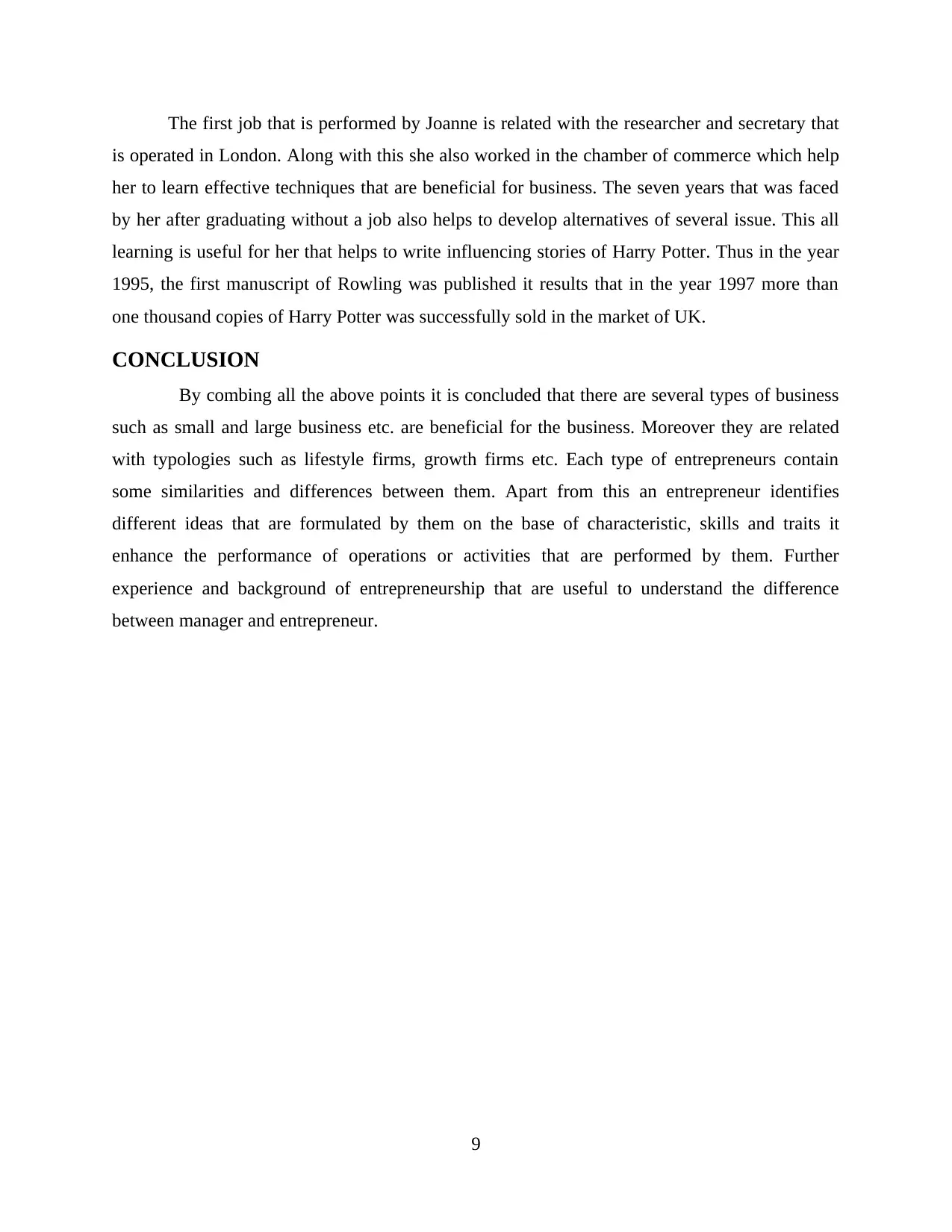
The first job that is performed by Joanne is related with the researcher and secretary that
is operated in London. Along with this she also worked in the chamber of commerce which help
her to learn effective techniques that are beneficial for business. The seven years that was faced
by her after graduating without a job also helps to develop alternatives of several issue. This all
learning is useful for her that helps to write influencing stories of Harry Potter. Thus in the year
1995, the first manuscript of Rowling was published it results that in the year 1997 more than
one thousand copies of Harry Potter was successfully sold in the market of UK.
CONCLUSION
By combing all the above points it is concluded that there are several types of business
such as small and large business etc. are beneficial for the business. Moreover they are related
with typologies such as lifestyle firms, growth firms etc. Each type of entrepreneurs contain
some similarities and differences between them. Apart from this an entrepreneur identifies
different ideas that are formulated by them on the base of characteristic, skills and traits it
enhance the performance of operations or activities that are performed by them. Further
experience and background of entrepreneurship that are useful to understand the difference
between manager and entrepreneur.
9
is operated in London. Along with this she also worked in the chamber of commerce which help
her to learn effective techniques that are beneficial for business. The seven years that was faced
by her after graduating without a job also helps to develop alternatives of several issue. This all
learning is useful for her that helps to write influencing stories of Harry Potter. Thus in the year
1995, the first manuscript of Rowling was published it results that in the year 1997 more than
one thousand copies of Harry Potter was successfully sold in the market of UK.
CONCLUSION
By combing all the above points it is concluded that there are several types of business
such as small and large business etc. are beneficial for the business. Moreover they are related
with typologies such as lifestyle firms, growth firms etc. Each type of entrepreneurs contain
some similarities and differences between them. Apart from this an entrepreneur identifies
different ideas that are formulated by them on the base of characteristic, skills and traits it
enhance the performance of operations or activities that are performed by them. Further
experience and background of entrepreneurship that are useful to understand the difference
between manager and entrepreneur.
9
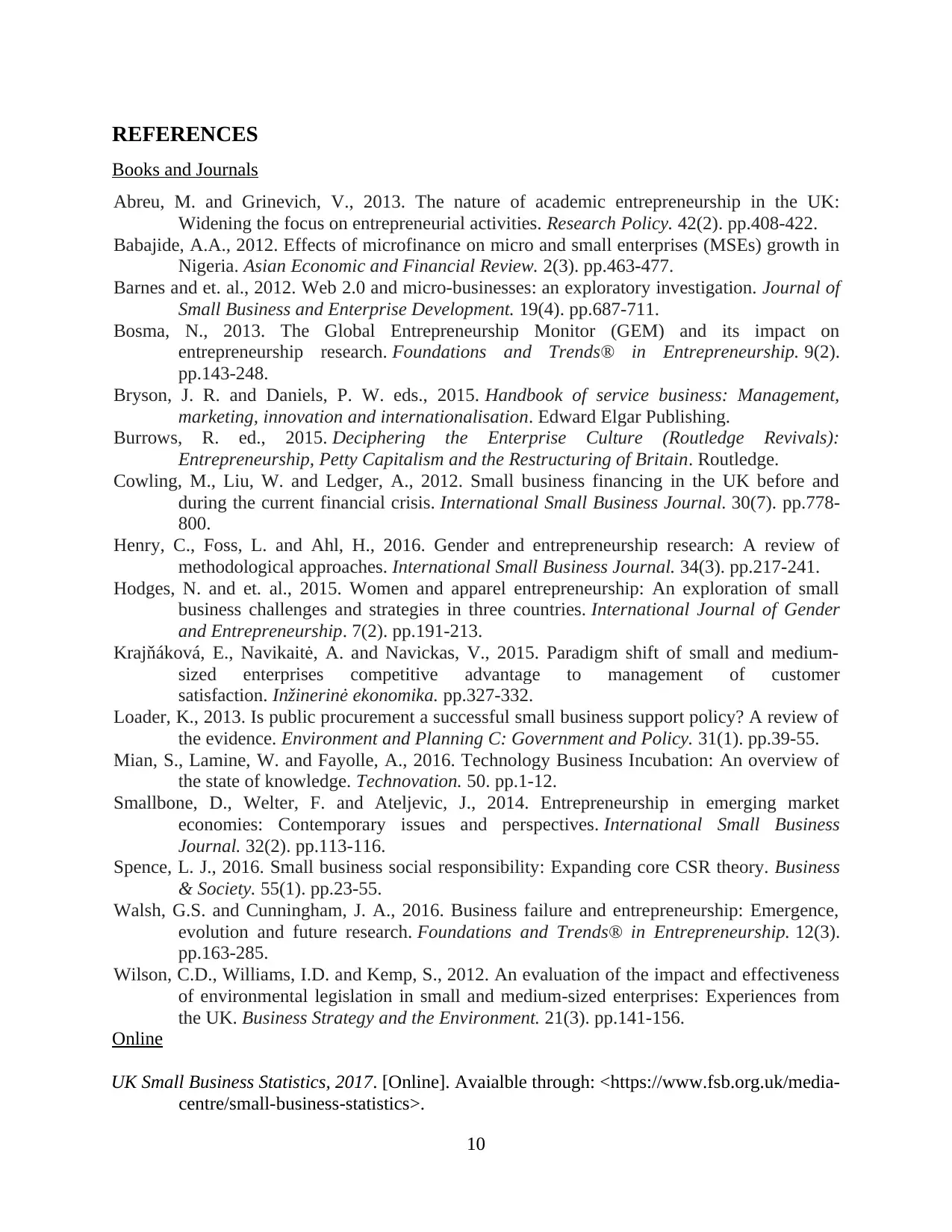
REFERENCES
Books and Journals
Abreu, M. and Grinevich, V., 2013. The nature of academic entrepreneurship in the UK:
Widening the focus on entrepreneurial activities. Research Policy. 42(2). pp.408-422.
Babajide, A.A., 2012. Effects of microfinance on micro and small enterprises (MSEs) growth in
Nigeria. Asian Economic and Financial Review. 2(3). pp.463-477.
Barnes and et. al., 2012. Web 2.0 and micro-businesses: an exploratory investigation. Journal of
Small Business and Enterprise Development. 19(4). pp.687-711.
Bosma, N., 2013. The Global Entrepreneurship Monitor (GEM) and its impact on
entrepreneurship research. Foundations and Trends® in Entrepreneurship. 9(2).
pp.143-248.
Bryson, J. R. and Daniels, P. W. eds., 2015. Handbook of service business: Management,
marketing, innovation and internationalisation. Edward Elgar Publishing.
Burrows, R. ed., 2015. Deciphering the Enterprise Culture (Routledge Revivals):
Entrepreneurship, Petty Capitalism and the Restructuring of Britain. Routledge.
Cowling, M., Liu, W. and Ledger, A., 2012. Small business financing in the UK before and
during the current financial crisis. International Small Business Journal. 30(7). pp.778-
800.
Henry, C., Foss, L. and Ahl, H., 2016. Gender and entrepreneurship research: A review of
methodological approaches. International Small Business Journal. 34(3). pp.217-241.
Hodges, N. and et. al., 2015. Women and apparel entrepreneurship: An exploration of small
business challenges and strategies in three countries. International Journal of Gender
and Entrepreneurship. 7(2). pp.191-213.
Krajňáková, E., Navikaitė, A. and Navickas, V., 2015. Paradigm shift of small and medium-
sized enterprises competitive advantage to management of customer
satisfaction. Inžinerinė ekonomika. pp.327-332.
Loader, K., 2013. Is public procurement a successful small business support policy? A review of
the evidence. Environment and Planning C: Government and Policy. 31(1). pp.39-55.
Mian, S., Lamine, W. and Fayolle, A., 2016. Technology Business Incubation: An overview of
the state of knowledge. Technovation. 50. pp.1-12.
Smallbone, D., Welter, F. and Ateljevic, J., 2014. Entrepreneurship in emerging market
economies: Contemporary issues and perspectives. International Small Business
Journal. 32(2). pp.113-116.
Spence, L. J., 2016. Small business social responsibility: Expanding core CSR theory. Business
& Society. 55(1). pp.23-55.
Walsh, G.S. and Cunningham, J. A., 2016. Business failure and entrepreneurship: Emergence,
evolution and future research. Foundations and Trends® in Entrepreneurship. 12(3).
pp.163-285.
Wilson, C.D., Williams, I.D. and Kemp, S., 2012. An evaluation of the impact and effectiveness
of environmental legislation in small and medium‐sized enterprises: Experiences from
the UK. Business Strategy and the Environment. 21(3). pp.141-156.
Online
UK Small Business Statistics, 2017. [Online]. Avaialble through: <https://www.fsb.org.uk/media-
centre/small-business-statistics>.
10
Books and Journals
Abreu, M. and Grinevich, V., 2013. The nature of academic entrepreneurship in the UK:
Widening the focus on entrepreneurial activities. Research Policy. 42(2). pp.408-422.
Babajide, A.A., 2012. Effects of microfinance on micro and small enterprises (MSEs) growth in
Nigeria. Asian Economic and Financial Review. 2(3). pp.463-477.
Barnes and et. al., 2012. Web 2.0 and micro-businesses: an exploratory investigation. Journal of
Small Business and Enterprise Development. 19(4). pp.687-711.
Bosma, N., 2013. The Global Entrepreneurship Monitor (GEM) and its impact on
entrepreneurship research. Foundations and Trends® in Entrepreneurship. 9(2).
pp.143-248.
Bryson, J. R. and Daniels, P. W. eds., 2015. Handbook of service business: Management,
marketing, innovation and internationalisation. Edward Elgar Publishing.
Burrows, R. ed., 2015. Deciphering the Enterprise Culture (Routledge Revivals):
Entrepreneurship, Petty Capitalism and the Restructuring of Britain. Routledge.
Cowling, M., Liu, W. and Ledger, A., 2012. Small business financing in the UK before and
during the current financial crisis. International Small Business Journal. 30(7). pp.778-
800.
Henry, C., Foss, L. and Ahl, H., 2016. Gender and entrepreneurship research: A review of
methodological approaches. International Small Business Journal. 34(3). pp.217-241.
Hodges, N. and et. al., 2015. Women and apparel entrepreneurship: An exploration of small
business challenges and strategies in three countries. International Journal of Gender
and Entrepreneurship. 7(2). pp.191-213.
Krajňáková, E., Navikaitė, A. and Navickas, V., 2015. Paradigm shift of small and medium-
sized enterprises competitive advantage to management of customer
satisfaction. Inžinerinė ekonomika. pp.327-332.
Loader, K., 2013. Is public procurement a successful small business support policy? A review of
the evidence. Environment and Planning C: Government and Policy. 31(1). pp.39-55.
Mian, S., Lamine, W. and Fayolle, A., 2016. Technology Business Incubation: An overview of
the state of knowledge. Technovation. 50. pp.1-12.
Smallbone, D., Welter, F. and Ateljevic, J., 2014. Entrepreneurship in emerging market
economies: Contemporary issues and perspectives. International Small Business
Journal. 32(2). pp.113-116.
Spence, L. J., 2016. Small business social responsibility: Expanding core CSR theory. Business
& Society. 55(1). pp.23-55.
Walsh, G.S. and Cunningham, J. A., 2016. Business failure and entrepreneurship: Emergence,
evolution and future research. Foundations and Trends® in Entrepreneurship. 12(3).
pp.163-285.
Wilson, C.D., Williams, I.D. and Kemp, S., 2012. An evaluation of the impact and effectiveness
of environmental legislation in small and medium‐sized enterprises: Experiences from
the UK. Business Strategy and the Environment. 21(3). pp.141-156.
Online
UK Small Business Statistics, 2017. [Online]. Avaialble through: <https://www.fsb.org.uk/media-
centre/small-business-statistics>.
10

Traits of an entrepreneur. 2017.[online]. Available through:<https://startupnation.com/start-
your-business/successful-entrepreneurs-traits/>
11
your-business/successful-entrepreneurs-traits/>
11
1 out of 13
Related Documents
Your All-in-One AI-Powered Toolkit for Academic Success.
+13062052269
info@desklib.com
Available 24*7 on WhatsApp / Email
![[object Object]](/_next/static/media/star-bottom.7253800d.svg)
Unlock your academic potential
© 2024 | Zucol Services PVT LTD | All rights reserved.




